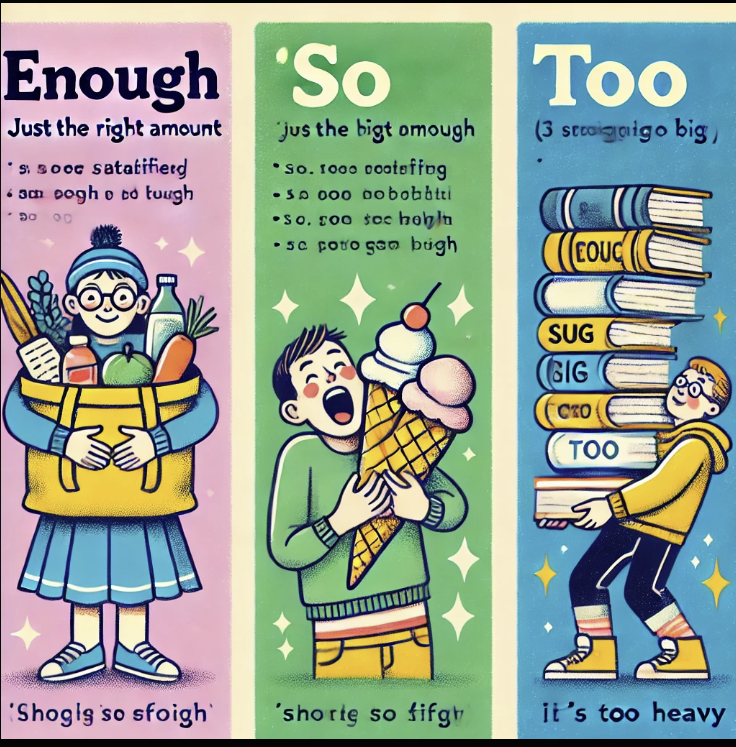
안녕하세요 이웃님들 ^.^
좋은 아침 입니다.
오늘은 간만에 문법? ㅎㅎ
하나 포스팅 해볼께요.
Enough, so , too의 단어뜻은 모두들 아시죠?
그런데 문장에서 어떤게 들어가야 맞는건지 헷갈릴때가 종종 있지요.
그래서 3가지 단어의 정확한 사용법과
문제 풀이를 통해서 확실히 한번 살펴 봅시다.
1. Enough (충분히, 충분한)
Enough는 형용사, 부사, 명사로 사용되며, **"충분히"**라는 의미를 갖고 있어.
(1) 형용사/부사와 함께 사용 (충분히 ~하다)
👉 형용사/부사 + enough
- 형용사나 부사 뒤에 위치하며, "~하기에 충분하다"는 의미를 가진다.
🔹 예문:
- She is old enough to drive. (그녀는 운전하기에 충분히 나이가 많다.)
- He didn’t run fast enough to win the race. (그는 경주에서 이기기엔 충분히 빠르게 달리지 못했다.)
- Is the coffee hot enough for you? (커피가 너에게 충분히 뜨거운가?)
(2) 명사와 함께 사용 (충분한 ~)
👉 Enough + 명사
- 명사 앞에 위치하며, "충분한 ~"이라는 의미를 가진다.
🔹 예문:
- We have enough time to finish this project. (우리는 이 프로젝트를 끝내기에 충분한 시간이 있다.)
- There isn’t enough food for everyone. (모든 사람을 위한 충분한 음식이 없다.)
- Do you have enough money to buy it? (그걸 사기에 충분한 돈이 있니?)
(3) 동사와 함께 사용 (충분히 ~하다)
👉 동사 + enough
- 동사 뒤에 위치하며, "충분히 ~하다"라는 의미를 갖는다.
🔹 예문:
- She didn’t study enough for the exam. (그녀는 시험을 위해 충분히 공부하지 않았다.)
- He doesn’t eat enough. (그는 충분히 먹지 않는다.)
- I slept enough last night. (나는 어젯밤에 충분히 잤다.)
2. So (너무, 매우, 그래서)
So는 강조의 의미로 사용되거나, 결과를 나타낼 때 사용돼.
(1) 형용사/부사와 함께 사용 (매우, 너무)
👉 So + 형용사/부사
- "너무 ~하다, 매우 ~하다"라는 뜻으로 강조할 때 사용돼.
🔹 예문:
- The movie was so interesting! (그 영화는 너무 재미있었다!)
- She speaks so fast. (그녀는 너무 빠르게 말한다.)
- This coffee is so hot. (이 커피는 너무 뜨겁다.)
- It’s so cold outside. (밖이 너무 춥다.)
(2) 결과를 나타낼 때 (그래서)
👉 So + 주어 + 동사
- "그래서"라는 의미로 두 문장을 연결할 때 사용돼.
🔹 예문:
- It started raining, so we stayed inside. (비가 오기 시작해서, 우리는 안에 있었다.)
- She was tired, so she went to bed early. (그녀는 피곤해서, 일찍 잠자리에 들었다.)
- I forgot my wallet, so I couldn't buy lunch. (지갑을 잊어버려서, 점심을 살 수 없었다.)
3. Too (너무, 또한)
Too는 "너무 (~해서 안 좋은)", 또는 **"또한, ~도"**의 뜻으로 사용돼.
(1) 형용사/부사와 함께 사용 (너무 ~해서 안 좋은)
👉 Too + 형용사/부사
- "너무 ~하다 (그래서 문제다)"라는 부정적인 의미를 가질 때 사용돼.
🔹 예문:
- This bag is too expensive. (이 가방은 너무 비싸다.)
- The soup is too salty. (이 스프는 너무 짜다.)
- She spoke too fast, so I couldn’t understand. (그녀가 너무 빠르게 말해서 이해할 수 없었다.)
- It’s too cold to go outside. (밖에 나가기엔 너무 춥다.)
(2) 문장의 끝에서 사용 (또한, ~도)
👉 , too
- 문장 끝에 위치하며, "~도 또한"이라는 의미를 가진다.
🔹 예문:
- I like coffee, too. (나도 커피를 좋아해.)
- He wants to go, too. (그도 가고 싶어 한다.)
- She is coming to the party, too. (그녀도 파티에 온다.)
- I was tired, and she was, too. (나는 피곤했고, 그녀도 그랬다.)
그럼 이제 문제를 통해서 살펴 볼까요?
1. These bananas are not ............................... to be eaten.
a. enough ripe
b. ripe enough
c. so ripe
2. They are ........................... to buy anything.
a. too rich
b. so rich
c. enough rich
d. rich enough
3. The coat was .............................. for me to buy.
a. so expensive
b. too expensive
c. expensive enough
4. She is ............................. beautiful.
a. so
b. too
c. enough
d.Wrong!
5. It is .......................... expensive.
a. so
b. too
c. Either could be used here
6. She is ............................ young to understand better.
a. too
b. so
c. very
d. Wrong!
7. She is ........................... to know better.
a. too old
b. old enough
c. so old
8. He was ........................... weak to even sit up.
a. so
b. too
c. very
9. He was ............................. weak that he could not even sit up.
a. so
b. too
c. very
10. The wall was ............................. for me to climb.
a. too high
b. so high
c. high enough
11. The soup is ............................... for me to relish.
a. too salty
b. very salty
c. salty enough
12. He was ............................. to realize his mistake.
a. so smart
b. too smart
c. enough smart
d. smart enough
정답
1. These bananas are not ripe enough to be eaten.
2. They are rich enough to buy anything.
3. The coat was too expensive for me to buy.
4. She is so beautiful.
5. It is so/too expensive.
6. She is too young to understand better.
7. She is old enough to know better.
8. He was too weak to even sit up.
9. He was so weak that he could not even sit up.
10. The wall was too high for me to climb.
11. The soup is too salty for me to relish.
12. He was smart enough to realize his mistake
'영어' 카테고리의 다른 글
| [영어] 사생결단을 영어로 어떻게 표현을 할수 있을까요? (72) | 2025.03.17 |
|---|---|
| [영어] Go belly up을 아시나요? (47) | 2025.03.15 |
| [영어] 개판이야를 영어로 표현을 어떻게 할까요? (70) | 2025.03.08 |
| [영어] Should vs should be, should have been의 차이를 아시나요? (105) | 2025.03.05 |
| [영어] '잘나가다'를 영어로 표현을 어떻게 할까요? (110) | 2025.03.03 |